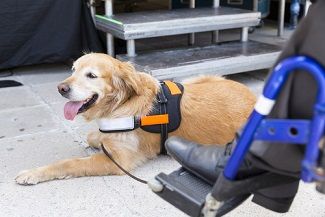Functional MRI As an Early Predictor of Service Dog Work Suitability
When conducted early in a dog’s service training, functional MRI may be able to predict suitability for service work, saving significant time and money.

Functional magnetic resonance imaging (fMRI), conducted early in a dog’s service training, may be able to predict the dog’s suitability for service work, according to a study recently published in Nature Scientific Reports. The authors noted that this was the largest single canine fMRI study to date.
fMRI maps differences in brain activity by detecting blood flow changes in response to a stimulus or action. In recent years, fMRI has been performed in awake dogs, providing insight into canine brain organization.
Few dogs are suitable for service work. In fact, only 30% of dogs in service training programs successfully complete their training. With the cost of service dog training ranging from $20,000 to $50,000 per dog, early detection of suitability could significantly reduce training costs.
Previous studies have evaluated the predictive value of behavioral tests and temperament questionnaires in determining service dog potential in juvenile dogs. However, the authors noted, issues such as variable inter-rater agreement call into question the usefulness of these approaches.
For the current study, the authors selected 54 dogs, aged 17 to 21 months, from a service training program. Within 2 weeks of beginning training, dogs not displaying noise reactivity underwent a 2-month fMRI training process using a mock MRI machine. During the training, dogs were acclimatized to the machine and to the overall MRI process. Dogs also learned two reward hand signals, “treat” and “no treat,” performed by a familiar handler or a stranger.
After training, dogs underwent live fMRI scans during which the handler and stranger showed the hand signals. Activity in the caudate (reward sensitivity), amygdala (arousal), and visual cortex (responsiveness to faces) regions was evaluated.
The authors collected data on sex and overall temperament; temperament was assessed midway through service training. They developed behavior- and brain-based statistical models to evaluate each models’ accuracy in predicting service training outcome.
Results
Of the 54 selected dogs, 43 completed the fMRI scans and service training. Nearly 80% of these 43 dogs were placed in some form of service work (e.g., service dog, skilled companion).
Statistical Model Analysis
The brain-based model demonstrated effectiveness in predicting training outcome, particularly training failure. Notably, the negative predictive value (percentage of dogs predicted to fail training that truly did) was markedly higher for the brain-based model than the behavior-based model (67% vs 47%). The positive predictive values (percentage of dogs predicted to pass training that truly did) between models were even higher (brain-based, 94%; behavior-based, 92%).
These findings suggest that fMRI performed early in the service training process could reliably identify dogs unfit for service work, thus significantly reducing training costs. Whether fMRI would be useful for other training programs (eg, military) is not yet known, though, because other populations of dogs were not included in the current study.
Correlation Between Brain Region Activity and Training Outcome
Caudate activity was positively correlated with training outcome success. This activity was strongest in the dogs that successfully completed service training, regardless of who gave the hand signals.
Amygdala activity was negatively correlated with successful training and was strongest when the stranger gave the hand signals. Interestingly, no outward behavioral changes were noted despite the strong amygdala activity.
Conclusions
Overall, the study’s findings suggest that fMRI offers predictive value in determining a dog’s suitability for service work, especially in terms of motivation and arousal. In addition, the authors noted, the findings provide insight into a dog’s brain activity in the absence of outward behavioral changes.
Dr. JoAnna Pendergrass received her Doctor of Veterinary Medicine degree from the Virginia-Maryland College of Veterinary Medicine. Following veterinary school, she completed a postdoctoral fellowship at Emory University’s Yerkes National Primate Research Center. Dr. Pendergrass is the founder and owner of JPen Communications, LLC, a medical communications company.